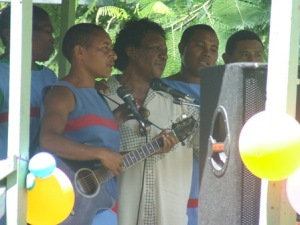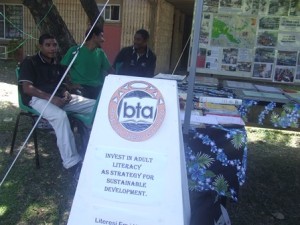A new Chapter in my Life! Getting there.
Month: October 2015
Illiteracy, unseen but rife
Mary was raised by a single father. Growing up in the 70s and 80s in Kaugere, life was a struggle. Located in the heart of Port Moresby, Kaugere was a No Go Zone with a stark contrast – home to notorious gangs mainly from the Southern Region and the churning pot of some of the country’s influential leaders.
Education liberates and yet the challenges of life forced Mary to sacrifice for her younger siblings.
“My father remarried another woman from the Gulf Province. I had just started Grade 1 but I noticed things were not right at home. My step mother was very young and was not interested in taking care of us, especially my younger siblings.
Every time I came back from school I would find my younger brother and sister crying because they were hungry. They would always be dirty, rugged looking – they just looked unloved. This happened every day. I felt there was no point in me going to school. I needed to stay home with my younger siblings and take care of them- to show them that there was someone who cared for them. So I made that decision to stay home.
That was my life from then on, I left school and never returned, whereas my brother and sister went to school.
Education
During my era, the education system was such that you dropped out at Grade 6 if you didn’t do well. My sister didn’t pass her exams and dropped out at Grade 6. But through the help of some family members, she was able to upgrade her marks through CODE (now called FODE) whereas my brother left school at Grade 6 and worked as a salesman.
Unfortunately, due to peer influences of drinking and mixing with the wrong crowd, it cost him his life. He died under tragic circumstances at age 32.
I never went to school but I joined a bible study group with the Jehovah Witnesses and that was how I was able to read some words. While I could read some words, I couldn’t understand what I was reading. Within me, there was a lifelong burning desire to be able to read, write and understand.
Struggles of illiteracy
To not read, write and understand is a major challenge. You cannot write things down, do a quote or sign papers. Simple things like filling out forms or deposit slips at the bank were a nightmare.
It’s embarrassing to ask someone to help you.
There are some people who are helpful but many times, people just shrug their shoulders and walk off. You feel helpless and hopeless. When I didn’t know how to read and write it was like a sore in my heart – it is very hard to communicate.
When people look at me, they see how well groomed I am but when I tell them that I cannot read and write – many people look at me in disbelief. Others glare at me, while others ask in a downgrading tone –you don’t know how to read and write? It hurts. It’s very painful. In the office, I would make a lot of excuses like tell people I would read their materials or correspondences later.
While I was at home with my parents, I helped my father with his business. He was a contractor and I helped him do odd jobs, drive for him and so on. After a while I felt that it was too much for me to take so I ran away and got married at the age of 16 years. Years later, I used the skills and knowledge I gained from my father for my personal use such as building the family home, our store and other constructions. It was only after two years after my father died that I decided to continue his business.
Enrollment at Literacy School
I learnt about the Anglicare Literacy Program from a friend who attended the literacy program. He told me that the Anglicare Literacy Program catered for adults who had never gone to school by giving them the opportunity to learn to read and write. I enrolled in 2012 and have been there since.
Reflections
I lived in the settlement and the standard of living there is very low. The family unit is breaking down, children are not in school and the number of unwanted and neglected children is increasing. The literacy programs provide an alternative for these children. PNG has vast resources and money from these resources which must benefit the citizens. I am fortunate that the skills and knowledge acquired from my father while not in school, has enabled me to be independent, but I feel for those children whose parents do not have any skills to pass on to them. There are many people in our class who come from different walks of life who are struggling.
In the Anglicare literacy program the oldest student is 65 years. She learnt how to speak in English through the literacy program. She can speak English to her bubus and read the bible which was her personal goal. In our class, the youngest is 12 years. Family issues like neglect, broken homes, violence adoption and so on are major contributing factors to why people cannot read and write.
Government support for the neglected
The government needs to look at these people who are wandering around aimlessly; some are selling Asian products on the street. I once asked a child begging on the street – where are your parents? And he responded, I don’t have any parents and I don’t know who gave birth to me. This child looked like he was 12 years old.
Out of school youths need to be supported in adult literacy programs. Free education provides and opportunity for all children to go to school but these children will take time to grow. What about those who are already grown up young men and women? They need to be educated too and to be utilised. The national government must identify where are the established literacy providers and fund these programs to enable out of school youths and those who have never been to school to be literate and gain new knowledge through Adult Literacy Programs.
Literacy breaks the cycle of dependence
Through literacy I can now do a lot of things I could not do. Today, I am able to help my kids with their school work. This sore in my heart is gone. Now I can look forward to new things. I faced many difficulties in my journey of life – abusive relationships, neglect, lack of support etc. I see my ex class mates who have advanced and think what would life be like for me if I was educated. But I push on. Anglicare has given me a new life.
Hopes
My dream is to extend my business. There are not many women in the work that I am doing in the construction industry. I do my business honestly and find that it’s a struggle. I’ve given proposals to people who have taken them and used it for themselves. Transparency and honesty are values that are diminishing. Wantok system and bribery are a norm that is driving genuine business people who believe in value and quality, out of business.
There are many men and women like me out there who are struggling and I hope that my story will inspire them to make a change in their life”.
*For confidential purposes, we have not used Mary and not her real name.


